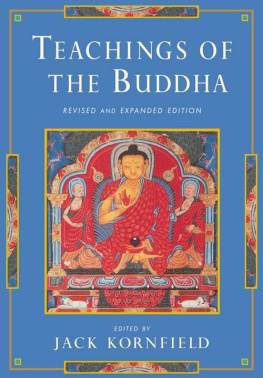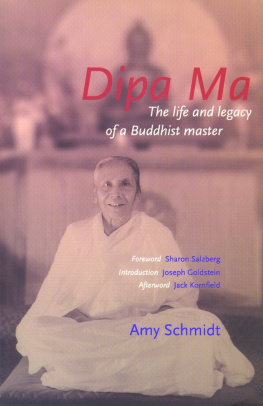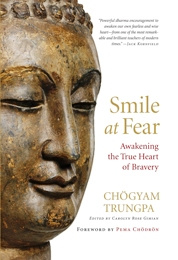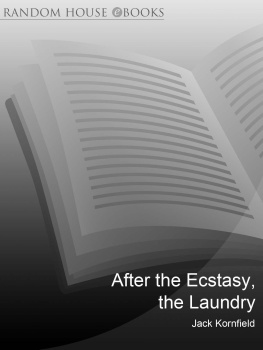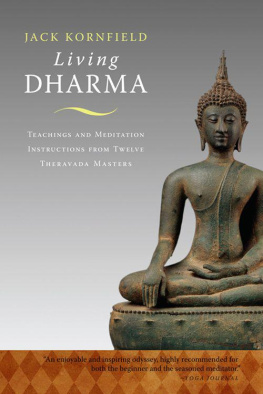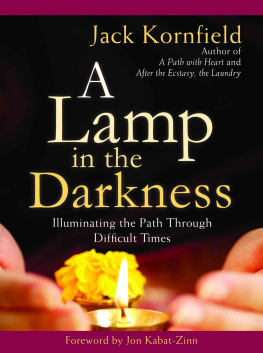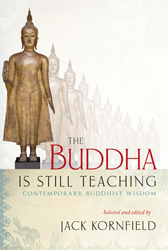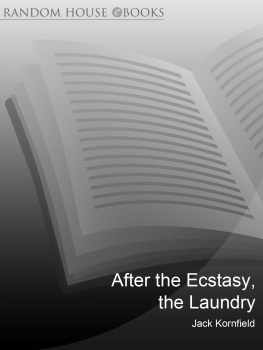Jack Kornfield - The Wise Heart: A Guide to the Universal Teachings of Buddhist Psychology
Here you can read online Jack Kornfield - The Wise Heart: A Guide to the Universal Teachings of Buddhist Psychology full text of the book (entire story) in english for free. Download pdf and epub, get meaning, cover and reviews about this ebook. year: 2008, publisher: Bantam, genre: Religion. Description of the work, (preface) as well as reviews are available. Best literature library LitArk.com created for fans of good reading and offers a wide selection of genres:
Romance novel
Science fiction
Adventure
Detective
Science
History
Home and family
Prose
Art
Politics
Computer
Non-fiction
Religion
Business
Children
Humor
Choose a favorite category and find really read worthwhile books. Enjoy immersion in the world of imagination, feel the emotions of the characters or learn something new for yourself, make an fascinating discovery.

- Book:The Wise Heart: A Guide to the Universal Teachings of Buddhist Psychology
- Author:
- Publisher:Bantam
- Genre:
- Year:2008
- Rating:4 / 5
- Favourites:Add to favourites
- Your mark:
- 80
- 1
- 2
- 3
- 4
- 5
The Wise Heart: A Guide to the Universal Teachings of Buddhist Psychology: summary, description and annotation
We offer to read an annotation, description, summary or preface (depends on what the author of the book "The Wise Heart: A Guide to the Universal Teachings of Buddhist Psychology" wrote himself). If you haven't found the necessary information about the book — write in the comments, we will try to find it.
The Wise Heart: A Guide to the Universal Teachings of Buddhist Psychology — read online for free the complete book (whole text) full work
Below is the text of the book, divided by pages. System saving the place of the last page read, allows you to conveniently read the book "The Wise Heart: A Guide to the Universal Teachings of Buddhist Psychology" online for free, without having to search again every time where you left off. Put a bookmark, and you can go to the page where you finished reading at any time.
Font size:
Interval:
Bookmark:
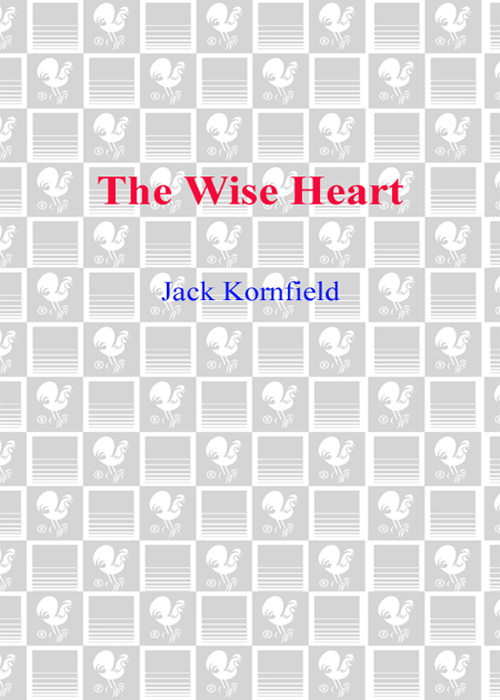
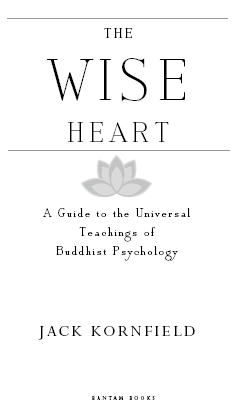
Contents
To
Aung San Suu Kyi
and the
monks and nuns of Burma
and
To all our children:
May they live with a wise heart
Buddhist teachings are not a religion,
they are a science of mind.
THE DALAI LAMA
INTRODUCTION
L ast year I joined with Zen Master Thich Nhat Hanh to co-lead a conference on mindfulness and psychotherapy at UCLA. As I stood at the podium looking over a crowd of almost two thousand people, I wondered what had drawn so many to this three-day gathering. Was it the need to take a deep breath and find a wiser way to cope with the conflict, stress, fears, and exhaustion so common in modern life? Was it the longing for a psychology that included the spiritual dimension and the highest human potential in its vision of healing? Was it a hope to find simple ways to quiet the mind and open the heart?
I found that I had to speak personally and practically, as I do in this book. These conference participants wanted the same inspiration and support as the students who come to Spirit Rock Meditation Center near San Francisco. Those who enter our light-filled meditation hall are not running away from life, but seeking a wise path through it. They each bring their personal problems and their genuine search for happiness. Often they carry a burden of concern for the world, with its continuing warfare and ever-deepening environmental problems. They wonder what will be left for their childrens generation. They have heard about meditation and hope to find the joy and inner freedom that Buddhist teachings promise, along with a wiser way to care for the world.
Forty years ago, I arrived at a forest monastery in Thailand in search of my own happiness. A confused, lonely young man with a painful family history, I had graduated from Dartmouth College in Asian studies and asked the Peace Corps to send me to a Buddhist country. Looking back, I can see that I was trying to escape not only my family pain but also the materialism and sufferingso evident in the Vietnam Warof our culture at large. Working on rural health and medical teams in the provinces along the Mekong River, I heard about a meditation master, Ajahn Chah, who welcomed Western students. I was full of ideas and hopes that Buddhist teachings would help me, maybe even lead me to become enlightened. After months of visits to Ajahn Chahs monastery, I took monks vows. Over the next three years I was introduced to the practices of mindfulness, generosity, loving-kindness, and integrity, which are at the heart of Buddhist training. That was the beginning of a lifetime journey with Buddhist teachings.
Like Spirit Rock today, the forest monastery received a stream of visitors. Every day, Ajahn Chah would sit on a wooden bench at the edge of a clearing and greet them all: local rice farmers and devout pilgrims, seekers and soldiers, young people, government ministers from the capital, and Western students. All brought their spiritual questions and conflicts, their sorrows, fears, and aspirations. At one moment Ajahn Chah would be gently holding the head of a man whose young son had just died, at another laughing with a disillusioned shopkeeper at the arrogance of humanity. In the morning he might be teaching ethics to a semi-corrupt government official, in the afternoon offering a meditation on the nature of undying consciousness to a devout old nun.
Even among these total strangers, there was a remarkable atmosphere of safety and trust. All were held by the compassion of the master and the teachings that guided us together in the human journey of birth and death, joy and sorrow. We sat together as one human family.
Ajahn Chah and other Buddhist masters like him are practitioners of a living psychology: one of the oldest and most well-developed systems of healing and understanding on the face of the earth. This psychology makes no distinction between worldly and spiritual problems. To Ajahn Chah, anxiety, trauma, financial problems, physical difficulties, struggles with meditation, ethical dilemmas, and community conflict were all forms of suffering to be treated with the medicine of Buddhist teaching. He was able to respond to the wide range of human troubles and possibilities from his own deep meditation, and also from the vast array of skillful means passed down by his teachers. Sophisticated meditative disciplines, healing practices, cognitive and emotional trainings, conflict resolution techniqueshe used them all to awaken his visitors to their own qualities of integrity, equanimity, gratitude, and forgiveness.
The wisdom Ajahn Chah embodied as a healer also exists as an ancient written tradition, first set down as a record of the Buddhas teachings and then expanded by more than a hundred generations of study, commentary, and practice. This written tradition is a great storehouse of wisdom, a profound exploration of the human mind, but it is not easily accessible to Westerners.
At this moment, a winter rainstorm is drenching my simple writers cabin in the woods above Spirit Rock. On my desk are classic texts from many of the major historic schools of Buddhism: the Comprehensive Manual of Abhidhamma, the eight-thousand-verse large version of the Heart Sutra, with its teachings on form and emptiness, and a Tibetan text on consciousness by Longchenpa. Over time, I have learned to treasure these texts and know that they are filled with jewels of wisdom. Yet the Abhidhamma (or Abhidharma in Sanskrit), considered the masterwork of the early Theravada tradition and the ultimate compendium of Buddhist psychology, is also one of the most impenetrable books ever written. What are we to make of passages such as, The inseparable material phenomena constitute the pure octad; leading to the dodecad of bodily intimation and the lightness triad; all as material groups originating from consciousness? And the Heart Sutra, revered as a sacred text of Mahayana Buddhism in India, China, and Japan, can sound like a mixture of fantastical mythology and nearly indecipherable Zen puzzles. In the same way, for most readers, analyzing the biochemistry of a lifesaving drug might be as easy as deciphering some of Longchenpas teachings on self-existent empty primal cognition.
What we are all seeking is the experience that underlies these texts, which is rich and deep and joyfully free. When Laura arrives at Spirit Rock with her cancer diagnosis, or Sharon, the judge, comes to learn about forgiveness, each wants the pith, the heart understanding that illuminates these words. But how to find it?
Like my teacher Ajahn Chah, Ive tried to convey the essence of these texts as a living, immediate, and practical psychology. I have become part of a generation of Buddhist elders that includes Pema Chdrn, Sharon Salzberg, Joseph Goldstein, Thich Nhat Hanh, and others who have helped to introduce Buddhist teachings widely in the West. To do this while remaining true to our own roots, we have primarily focused on the core teachings, the essence of Buddhist wisdom that spans all traditions. Though this is a role different from that of more orthodox and scholarly Buddhists, it is central to bringing Buddhist teachings to a new culture. It has been a way of forging a non-sectarian and accessible approach to these remarkable teachings. This is what another of my teachers, Ajahn Buddhadasa, encouraged: not dividing the teachings into the schools of Theravada, Mahayana, or Vajrayana, but offering Buddhayana, the core living principles of awakening.
Next pageFont size:
Interval:
Bookmark:
Similar books «The Wise Heart: A Guide to the Universal Teachings of Buddhist Psychology»
Look at similar books to The Wise Heart: A Guide to the Universal Teachings of Buddhist Psychology. We have selected literature similar in name and meaning in the hope of providing readers with more options to find new, interesting, not yet read works.
Discussion, reviews of the book The Wise Heart: A Guide to the Universal Teachings of Buddhist Psychology and just readers' own opinions. Leave your comments, write what you think about the work, its meaning or the main characters. Specify what exactly you liked and what you didn't like, and why you think so.

